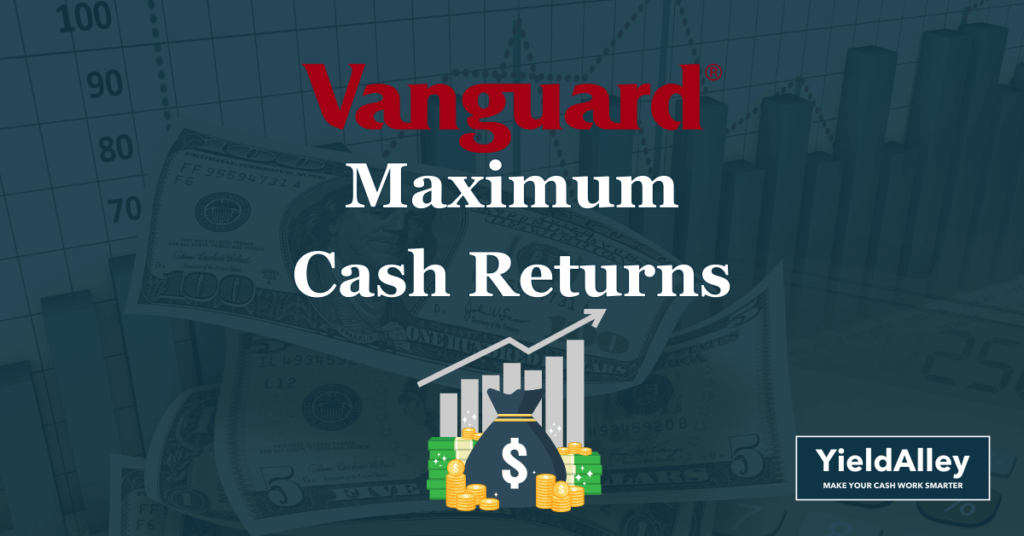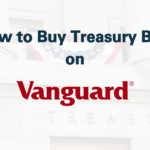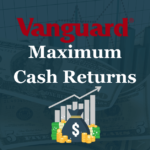If you have a Vanguard account and uninvested cash, you can earn very high returns on that cash with Vanguard investments. Vanguard offers investments you can buy to earn over 5% a year on your cash. This return is higher than what you’ll make from your bank or savings account, and it’s also simple, virtually risk-free, and extremely liquid. In this article, you’ll learn the simplest to the most complex ways to earn the highest cash returns on Vanguard. We’ll begin with Vanguard money market funds (and why they’re so popular), move on to Treasury bills and brokered CDs, and finally touch on money market ETFs (also known as ultra short-term bond ETFs).
Vanguard Money Market Funds
Vanguard money market funds are popular and famous for being extremely simple and cheap to use. The lowest returning fund on Vanguard generates over 5% a year.
Vanguard offers six unique money market funds that can be broken into two types:
- Government & Treasury money market funds (Vanguard offers 3 funds: VMFXX, VUSXX and VMRXX)
- Municipal money market funds (Vanguard offers 3 funds: VMSXX, VCTXX, VYFXX)
Vanguard previously offered a prime money market fund, but reorganized this fund in 2020 to a government money market fund which is now VMRXX.
The focus of our article will be on the government money market funds. Municipal funds offer certain tax benefits depending on where you live, so the tax benefits are state-specific. We’ll only cover government money market funds in this article since they offer much higher yields for most people and are far more popular than municipal money market funds.
You can read our detailed article on Vanguard money market funds for more specifics and comparisons.
Government Money Market Fund
Let’s review the first type of money market fund: the government & Treasury money market fund. Vanguard offers three funds in this category:
- VMFXX (Vanguard Federal Money Market Fund)
- VUSXX (Vanguard Treasury Money Market Fund)
- VMRXX (Vanguard Cash Reserves Federal Money Market Fund)
These three funds each hold different amounts of U.S. Treasury bills, short-term debt backed by U.S. Treasuries, or other U.S. government debt such as agency bonds (e.g., Fannie Mae). Treasury bills are considered the safest investments in the world because the U.S. government guarantees that it will pay back the money it borrows.
- VMFXX is the most popular Vanguard money market fund and manages $270 billion of customer funds. This is also the default settlement fund that sweeps any uninvested cash sitting in a Vanguard brokerage account. The fund holds repurchase agreements, U.S. government obligations, and U.S. Treasury Bills. VMFXX currently yields 5.30% with a year-to-date return of 4.63% and has an expense ratio of 0.11%.
- VUSXX is Vanguard’s Treasury money market fund and holds over 99% of its assets in U.S. Treasury bills. VUSXX currently yields 5.33% with a year-to-date return of 4.60% and has an expense ratio of 0.09%.
- VMRXX invests in similarly safe investments as VMFXX and VUSXX, but it also holds a significant amount of short-term debt that’s backed by U.S. Treasuries from financial services companies. VMRXX is slightly more risky than VMFXX due to the short-term corporate debt. Its yield is 5.31%, with a year-to-date return of 4.65% and an expense ratio of 0.10%.
Prime Money Market Fund
Vanguard used to offer a prime money market fund, but in 2020, Vanguard rebranded this fund into VMRXX, a government money market fund. Today, Vanguard no longer offers any prime money market funds.
Vanguard Money Market Funds vs. Fidelity Money Market Funds and Other Brokerages
If you have accounts at other brokerages, you’ll notice that Vanguard money market funds have some of the lowest expense ratios. Vanguard is known for charging extremely low fees to its customers. As a result, it can pass on more yield to its customers compared to Fidelity and Schwab.
Let’s compare two similar funds offered by Vanguard and Fidelity. VUSXX, the Vanguard Treasury Money Market Fund, has an equivalent fund on Fidelity called FDLXX (Fidelity Treasury Only Money Market Fund). Currently, VUSXX has a yield of 5.33% while FDLXX offers 5.01%, a 0.32% difference. This is largely because VUSXX charges an expense ratio of 0.09% compared to FDLXX’s 0.42% expense ratio. This is a 0.33% difference in fees!
Meanwhile, the same type of Treasury-only fund on Schwab is called SNSXX (Schwab U.S. Treasury Money Fund), which charges an expense ratio of 0.34% with no minimum investment. It has a yield of 5.10%. There are also no money market sweep features on the Schwab platform.
Vanguard has a minimum investment of $3,000 when you first purchase a money market fund. This is not a balance requirement, which means after your initial investment, you can have a balance of less than $3,000 in your money market fund position. Fidelity and Schwab do not have a minimum investment requirement for their funds.
Our Opinion on Vanguard Money Market Funds
Here is a table comparing the different Vanguard money market funds.
Best viewed on the desktop for a full comparison. Data as of December 2023.
Here’s our opinion on Vanguard money market funds if you want to keep things simple: Stick with VMFXX. It offers comparable yields compared to the other funds (VUSXX and VMRXX) and you’ll automatically earn the returns on any uninvested cash through Vanguard’s sweep feature.
As we mentioned earlier, VMFXX is Vanguard’s default settlement fund. Any of your uninvested cash will automatically be invested in VMFXX, and any time you want to purchase another investment, Vanguard will treat any VMFXX holdings as cash and automatically “sweep out” enough cash to fund any investments or withdrawals.
As an example, let’s say we had $10,000 in cash that’s automatically invested in VMFXX. We want to buy $3,000 of Tesla stock. Vanguard will instantly sell $3,000 worth of VMFXX to fund our purchase of Tesla stock. Vanguard lets us stay 100% liquid while earning over 5% returns! This is something you would never get with your bank CD or high-yield savings account.
Your decision to choose which money market fund to invest in will depend on your brokerage preference, desire for higher yields, and the amount of money you want to invest.
To learn more about Vanguard money market funds, check out the following articles:
- Best Vanguard Money Market Funds To Easily Grow Your Cash
- Money Market Funds: A Simple Way to Earn More Safe Cash
Treasury Bills on Vanguard
We can also buy Treasury bills ourselves directly on Vanguard. Vanguard money market funds hold a lot of Treasury bills, but it’s very simple for any individual to buy Treasury bills directly on Vanguard’s platform.
Treasury bills (also known as T-Bills) are U.S. Treasuries with a maturity of less than one year. Currently, the highest T-Bill yield is 5.34% on a 3-month maturity, and the lowest is 4.18% on a 5-year maturity.
Why would we want to buy a T-Bill ourselves? The main reasons are when the T-Bill yields are higher than money market fund yields, guaranteed state tax exemption, and to avoid Vanguard’s expense ratio.
In our opinion, Vanguard’s money market funds are usually more appealing than T-Bills. The expense ratios are so low, and VMFXX offers an automatic sweep in and out of the fund. Unless the yield on a T-Bill is much higher than a money market’s, we don’t recommend the hassle. T-Bills need to be manually bought and sold, and there’s also a settlement period after selling a T-Bill where we don’t have access to our cash for a couple of days.
However, in the last year, there were moments when the T-Bill yields were significantly higher than rates offered by Vanguard money market funds. In those cases, it’s definitely buying T-Bills directly ourselves. You can read our “How to Buy Treasury Bills on Vanguard” guide to learn the step-by-step process of how to do this on Vanguard from start to finish.
To learn more about Treasury bills on Vanguard, check out the following articles:
Bank CDs on Vanguard (or Brokered CDs)
The third route for higher cash returns is to buy bank CDs on Vanguard, also known as brokered CDs. Brokered CDs are just bank CDs you buy on a brokerage such as Vanguard. Vanguard brokered CDs offer higher yields than normal bank CDs because Vanguard negotiates with the banks that are issuing the CDs to offer Vanguard customers a better CD rate.
The highest yield for a Vanguard brokered CD with a maturity of one year or less is 5.60%. That’s the highest CD rate that Vanguard offers across all its maturities.
Meanwhile, Chase Bank offers a CD rate of around 2-3% depending on how much you invest. The highest Chase CD rate offered is 5%, reserved only for customers who invest a minimum of $100,000. With the bank CDs on Vanguard, you’ll be earning more with no such restrictions.
Be aware of two things when buying a brokered CD:
- These CD rates are guaranteed only if held to maturity. However, some brokered CDs are callable, which means the bank issuing the CD can recall them early. This is typically done when rates go down, so the banks won’t have to pay a higher interest rate. To prevent this, buy a non-callable CD to be able to hold the CD to maturity.
- Brokered CDs are liquid, meaning you can sell them on Vanguard’s secondary marketplace before they mature. But the secondary CD marketplace isn’t always super active, so you might not get the price you want to sell your CD at. Regardless, brokered CDs are still better and more liquid than regular bank CDs that force you to pay an early withdrawal penalty.
To learn more about Vanguard brokered CDs, check out the following articles:
- What are Brokered CDs?
- Vanguard CD Rates in December 2023
- How to Buy CDs Through Vanguard
- Bank CDs vs. Brokered CDs
- Bank Hopping For the Best CD Rates
Ultra Short-Term Bond ETFs (Money Market ETFs) on Fidelity
The last method to earn higher cash returns on Vanguard is to buy money market ETFs. Also known as ultra short-term bond ETFs, these investments are newer and thus more unknown and underappreciated compared to the previous investments we mentioned.
There are two main types of ultra short-term bond ETFs:
- Treasury ETF
- Floating rate Treasury ETF
Treasury ETFs hold very short-term Treasury bills, just like Treasury-only money market funds.
The most popular ultra short-term Treasury bond ETF is SGOV (iShares 0-3 Month Treasury Bond ETF). SGOV was introduced in 2020 and holds T-Bills with a maturity of 3 months or less. SGOV currently has a yield of 5.27% with a year-to-date return of 4.69%.
Floating rate Treasury ETFs, on the other hand, hold Treasury floating rate notes that always reflect the latest 3-month T-bill rate, which resets every week. In simple terms, you are always getting the most up-to-date 3-month T-Bill rate by holding these ETFs. As interest rates rise, floating rate Treasury ETFs pay higher interest payments. If rates fall, the payments decrease.
The most popular floating rate Treasury ETFs are USFR (WisdomTree Floating Rate Treasury Fund) and TFLO (iShares Treasury Floating Rate Bond ETF). USFR has a yield of 5.39% and a year-to-date return of 4.46%, while TFLO has a yield of 5.37% and a year-to-date return of 4.81%.
Ultra short-term bond ETFs have higher yields than Vanguard money market funds, are easier to buy than T-Bills, and are more liquid than brokered CDs.
The primary instance why we would buy a Vanguard money market fund instead of an ETF is the need for instant liquidity. VMFXX holdings are treated as cash and our funds are swept in and out depending on when we need cash to withdraw or purchase another investment.
ETFs, including ultra short-term bond ETFs, usually have a settlement period of two business days (referenced as T+2), which means cash will be available in your account two days after you sell. So it’s still extremely liquid, but you won’t have access to your cash instantly. In most cases, this is just fine for us.
To learn more about ultra short-term ETFs, check out the following articles:
Comparing Our Cash Returns Options on Vanguard
We’ve now reviewed the main types of investments to consider for higher cash returns on Vanguard: money market funds, Treasury bills, CDs, and ETFs.
To compare your options on Vanguard, we put together the table below that compares each investment’s yield, fees and costs, minimum investments, “sweep” features, and tax benefits if any.
Best viewed on the desktop for a full comparison. Data as of December 2023.
If you have a Vanguard account, it’s wise to move any cash from your bank or other accounts to your Vanguard account. You’ll automatically benefit from Vanguard’s sweep feature and begin earning returns with VMFXX instantly.
If you want to take matters into your own hands and earn more yield while still staying liquid, look into Treasury bills and ultra short-term bond ETFs. We have a preference for the floating rate ETFs as they earn you the most updated 13-month T-Bill rate every week. And brokered CDs on Fidelity generate some of the highest cash yields of all at the moment.
Don’t let your cash sit idle. It can be put to work and earn you virtually risk-free money, and significant returns in today’s market. Move your cash from your bank to Vanguard (or any other brokerage that you use) and start earning yield!





